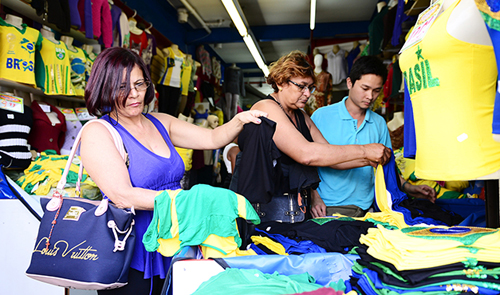The Vietnamese community in Brazil is small, made up of no more than 200 people, but has uniformly achieved financial success.
What is their key to success despite living in the world’s fifth largest country?
For most of the Vietnamese expats, the answer is found in the garment industry, paired with hard work and the abundance of business opportunities in Brazil.
A Vietnamese worker in the garment industry can be paid as much as US$5,000 a month and can save up to $2,000 after school fees and other expenses.
A bright example
At 2:00 am every morning, when the sky is still dark and cool, Huynh Van Thao – a Vietnamese immigrant in Sao Paulo – kisses his five-year-old son goodbye and leaves his 100 square meter apartment to drive to work.
For Thao and any other Vietnamese citizen of Brazil, each day except for Sunday begins at this time.
Thao drives to the flea market Brás, a major clothing trade area near the center of Sao Paulo, where he owns eight stalls, including two in the most favorable positions on the front of the main road in Brás.
The man, who comes from Cai Be District of the southern Vietnamese province of Tien Giang where he once worked as a goldsmith, left Vietnam for Sao Paulo with his wife in 2007 under the sponsorship of his sister Huynh Thi Thuy, who settled in Brazil in the 1990s.
Thuy created a prosperous business by selling handbags.
“In 2006-2010, I had 15 stalls which sold around 10,000 handbags a month,” she recalled.
“The Vietnamese community in Brazil has enjoyed a wealthy life thanks to trading in the garment industry.
“We went through years of staying up late and getting up early to work hard to make our fortune.”
When he first came to Sao Paulo, Thao worked for his sister and learned Portuguese, the official language of Brazil, before acquiring his first stall to sell clothes in Brás.
Now, Thao is a large wholesaler who sells fashionable clothes in exclusive designs. His daily work is to distribute clothes to smaller wholesalers who drive trucks to his stalls in Sao Paulo to receive goods and transport them all over Brazil.
Despite hiring 10 Brazilian workers, Thao shares the work with them.
“I am an owner but have to work with them. Otherwise, my staff may not respect me and won’t work hard,” Thao explained.
Following his success in Brazil thanks to the support of his sister, Thao sponsored his younger brother Huynh That, 29, to follow him in Sao Paulo in 2008 and also work in Brás.
Both Thao and That said humbly that they can make their fortune by ‘picking coins,’ quoting the adage “many a little makes a mickle.”
Vo Van Phuoc, owner of the Vietnamese restaurant Miss Saigon in Sao Paulo, revealed that brothers Thao and That are now millionaires in the city.
“Many young Vietnamese people who have recently immigrated to Brazil have proved their talent in business,” Phuoc said. “After several years in Brazil, Thao has expanded his business, selling thousands of shirts a day.”
Good chances in Brazil
“If you want, you can find so many jobs to do here,” Phuoc said of the opportunities in the South American nation.
“Business opportunities are not only in sales. A Vietnamese farmer can develop well here and make a big fortune because the land is fertile and cheap. You can buy three hectares of land in the suburbs for $15,000.
“Asian vegetables are more expensive than local products.
“You can keep chickens. Ducks especially give you a very high profit.
“A Japanese farmer invested $100,000 to keep ducks here and made a million U.S. dollars within a year,” Phuoc revealed.
Besides well known figures such as Miss Saigon owner Phuoc and Gooc garment factory owner Thai Quang Nghia, many other Vietnamese people have been successful in Brazil such as Ta Viet Dung, a businessman at the 25 de Marco Market and Nguyen Van Nghia, a tour guide.
|
Vietnam and Brazil celebrate 25 years of their diplomatic relations this year. In 1989, the two-way trade between the two nations was $16 million, but surged to almost $2.4 billion in 2013, increasing by 150 times. To Brazil, Vietnam mainly exports mobile phones and accessories, computers, sea products, shoes, clothes and man-made fiber. From Brazil, Vietnam imports maize, soybeans, steel and iron, and food for animals. |
Like us on Facebook or follow us on Twitter to get the latest news about Vietnam!





















































